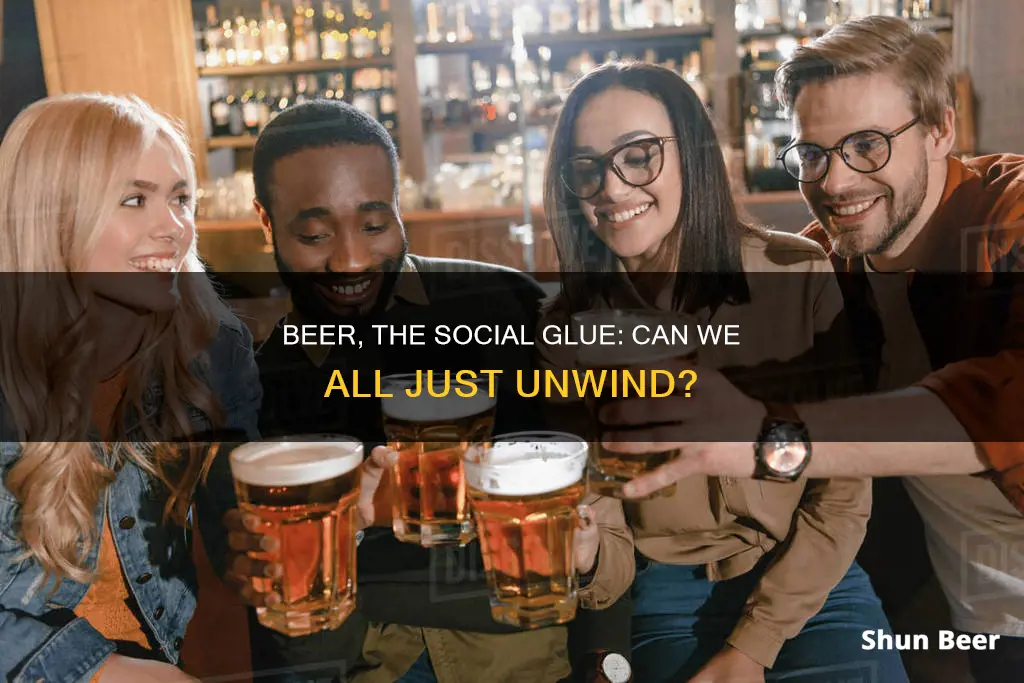
Can't we all just get along, drink a beer? is a line from the song Get Along by Kenny Chesney. The song, released in 2018, is about finding common ground and spreading love in a divided world. It encourages listeners to look past their differences, reflect on life and death, and focus on the simple pleasures that bring joy, love, and happiness. The line can't we all just get along, drink a beer captures the essence of the song's message, promoting camaraderie and a shared human experience over a casual drink.
| Characteristics | Values |
|---|---|
| Artist | Kenny Chesney |
| Songwriters | Shane McAnally, Ross Copperman, Josh Osborne |
| Album | Songs for the Saints |
| Record Label | Blue Chair, Warner Bros. Nashville |
| Genre | Country |
| Release Date | April 6, 2018 |
| Lyrics | "Drink a beer, sing a song / Make a friend, can't we all get along?" |
What You'll Learn

Beer and politics: the 'beer question'
Beer and Politics: The Beer Question
The phrase "can't we all just get along and drink a beer?" is reflected in the song "Get Along" by Kenny Chesney, which talks about putting aside differences and finding common ground. The song's chorus includes the lines "Drink a beer, sing a song / Make a friend, can't we all get along?" and promotes a positive message of connecting with others. This phrase also brings to mind the "beer question" in politics, which is a thought experiment that assesses the likability and authenticity of politicians by asking voters which candidate they would rather have a casual drink with.
The Beer Question in Politics
The "beer question" is a well-known concept in political opinion polling, particularly in the United States, that attempts to gauge how voters perceive the likability and authenticity of politicians. The question usually takes the form of "With which candidate would you rather have a beer?" and has been used as far back as the 2000 United States presidential election. This thought experiment has also been applied in hiring scenarios, dubbed the "beer test," where a hiring manager imagines having a drink with a potential candidate as a way to evaluate their fit with the company culture.
Criticism and Limitations
While the beer question provides insight into voter perceptions, it has been criticised for its gender bias, invoking a predominantly male drinking culture. Additionally, the relevance of likability in choosing candidates for public office has been questioned, as it may overshadow more important leadership qualities. Critics argue that focusing solely on likability can create a cycle of polling and analysis that becomes a self-fulfilling prophecy, making it difficult for candidates perceived as "unlikable" to gain traction.
Real-World Examples
During the 2016 United States presidential election, the beer question gained significant attention, with eventual Republican nominee and victor Donald Trump generally viewed favourably in this regard. In contrast, other candidates, particularly Democratic nominee Hillary Clinton, were seen as less authentic when it came to sharing a casual drink with voters. This example illustrates how the beer question can influence public perception and media coverage of candidates, potentially impacting their electoral success.
Beer Before Bed: Sleep Quality Impacted?
You may want to see also

Beer and gender bias
The phrase "can't we all just get along" is often used to encourage people to look past their differences and respect one another. This idea can be applied to addressing gender bias in the beer industry and drinking culture.
Beer has long been associated with a predominantly male drinking culture, and this bias is evident in various aspects of the beer world, from production to consumption. In terms of production, a Stanford University study revealed that participants preferred craft beer brewed by men over that brewed by women. This bias was not observed when participants were presented with cupcakes, a product typically associated with femininity. The study also found that gender bias was lessened when the beer had an award attached to it, suggesting that additional information confirming the brewer's expertise can help reduce bias.
The gender bias in beer drinking culture is also evident, particularly in the UK, which has one of the lowest percentages of female beer drinkers globally. Outdated sexist marketing, fear of weight gain, and negative perceptions about flavour are all factors that contribute to this disparity. Male-oriented advertising is a significant barrier for many women, with almost half of 18-24-year-old women citing it as a reason for not drinking beer. Taste is another factor, with 83% of women who don't drink beer stating they don't like the flavour. However, among women who do drink beer, 56% do so because they enjoy the taste.
To address these biases, some have suggested that the beer industry needs an image overhaul to make the drink more appealing to women. This could involve more inclusive marketing and addressing misconceptions about calorie content and taste. The 'Beer Drinking Women's Manifesto' encourages women to become advocates for beer, promoting sampling, different volumes and glassware, and dispelling myths about calories and acceptability.
By recognising and addressing these biases, the beer industry can become more inclusive and welcoming to women, both as consumers and brewers. This shift would align with the spirit of the phrase "can't we all just get along", fostering greater harmony and respect between different groups.
Good Friday Beer: Is It Allowed?
You may want to see also

Beer and socialising
Beer has long been associated with socialising and bringing people together. The phrase "can't we all just get along and drink a beer" captures the idea that sharing a beer with someone can be a casual and enjoyable social activity that fosters camaraderie and helps to set aside differences. This phrase is reminiscent of the song "Get Along" by American country music artist Kenny Chesney, which encourages listeners to find common ground and spread love. In the song, Chesney includes the lines "Drink a beer, sing a song / Make a friend, can't we all get along?", reflecting that life is long and that it is important to connect with others and create meaningful memories.
The social aspect of beer drinking is not just limited to casual social gatherings but has also entered the political sphere. The "beer question" is a thought experiment used in politics and hiring scenarios to gauge how likable or authentic a candidate is by asking voters or employees which candidate they would rather have a beer with. This question has been criticised for its gender bias, as it references a predominantly male drinking culture, and for its potential to prioritise likability over competence in the selection process.
However, the social aspect of beer drinking remains prevalent in many cultures. Beer gardens, pubs, and breweries often provide a social setting where people can gather, socialise, and bond over a drink. Beer festivals and tasting events also offer opportunities for social interaction and community building, bringing people together to celebrate and appreciate the art of brewing.
In conclusion, the phrase "can't we all just get along and drink a beer" highlights the social aspect of beer drinking and the potential for it to bring people together. Whether it is sharing a beer with friends, making new connections, or using it as a measure of compatibility, beer has become intertwined with socialising and creating shared experiences.
Mixing Mucinex and Beer: Is It Safe?
You may want to see also

Beer and country music
Country singers sure do love a beer. Whether it's to celebrate, unwind, or drown their sorrows, beer is a common theme in country music. Drinking songs and country music are a match made in heaven, and artists have been singing about beer for decades. From comical songs to sad songs, rowdy songs to cautionary tales, there's a beer-themed country song for every occasion.
Take, for example, the song "Get Along" by Kenny Chesney. In the song, Chesney sings about meeting a man wearing a t-shirt that says "Virginia is for lovers," with a Bible in one hand and a bottle in the other. The chorus encourages people to get along, and includes the lines "Drink a beer, sing a song / Make a friend, can't we all get along?". The song has a positive and uplifting message about finding common ground and getting along despite differences. It's a great example of how country music can bring people together and encourage harmony.
So, whether you're toasting to the good life or commiserating a broken heart, country music has a beer song for you.
Bottoms Up: How Do Self-Refilling Beer Cups Work?
You may want to see also

Beer and advertising
The phrase "can't we all just get along" is a lyric from the song "Get Along" by Kenny Chesney. The song encourages people to look past their differences and respect one another. This message of harmony and camaraderie is also reflected in the idea of sharing a beer and has been used in advertising to promote socialising and bonding.
Beer advertising has a long history, dating back to vintage print ads and evolving into modern digital campaigns. While the media and strategies have changed, the core objective remains: to capture the attention of consumers and build brand awareness. Beer ads often employ bold visuals, clever taglines, and creative storylines to engage their target audience.
In the UK, advertising rules for alcohol are strict, particularly when it comes to protecting young people. Ads must not be directed at those under 18 and must not contain anything that appeals to youth culture. The individuals featured in alcohol ads must be 25 or older and must appear to be so. Placement rules also exist to shield underage audiences from exposure to alcohol advertising.
Despite these regulations, beer advertising remains a powerful tool in the marketing world, utilising creative strategies to foster brand loyalty and community. Campaigns often tap into themes of socialising, enjoyment, and relaxation, aligning with the social nature of beer consumption.
The "beer question" in politics and hiring is another example of how beer is used as a social barometer. This thought experiment asks which political candidate or job applicant one would rather have a beer with, indicating a sense of likability and authenticity.
Overall, the theme of drinking a beer together conveys a sense of camaraderie and shared experience, making it a powerful concept in advertising and popular culture.
Understanding Beer Pumps: The Inner Workings Explained
You may want to see also
Frequently asked questions
The name of the song is "Get Along", written by Shane McAnally, Ross Copperman, and Josh Osborne and recorded by American country music artist Kenny Chesney.
The song encourages listeners to look past their differences and respect one another. It also reflects that we have a long life to live, and it should be remembered by the good deeds we do for each other and ourselves.
The "beer question" is a thought experiment in politics that attempts to measure authenticity and likability in politicians by asking voters which politicians they would prefer to drink beer with.
The "beer question" has been criticized for its implicit gender bias in referencing a predominantly male drinking culture, and some have questioned the relevance of likability in choosing candidates for public office.







